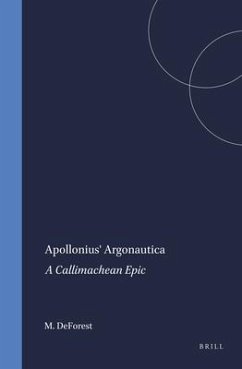The "Argonautica was said to have been the source of a quarrel between Apollonius, who wrote what looks like an epic poem, and Callimachus, who denounced the writing of epic poetry. Although the quarrel did not take place in the real world, its issue controls the poem. The heroes are determined to take part in a Homeric epic, which the Callimachean narrator refuses to write. Drawing on the methods of modern literary theorists but eschewing the jargon, DeForest shows how Apollonius uses the literary dispute in Alexandria to give a three-dimensional quality to his poem. The amusing conflict between heroes and narrator turns serious when the levels of narrative split apart and Medea steps into the gap as a free-standing figure, the forerunner of powerful women in fiction.
Hinweis: Dieser Artikel kann nur an eine deutsche Lieferadresse ausgeliefert werden.
Hinweis: Dieser Artikel kann nur an eine deutsche Lieferadresse ausgeliefert werden.








